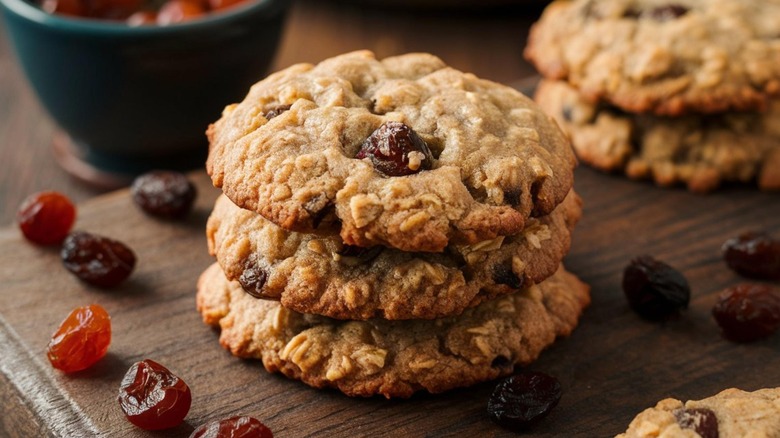The Trick To The Chewiest Possible Cookies Is Ignoring The Directions
Since baking is a science that involves biological, chemical, and physical reactions, you're likely inclined to follow recipes to the letter. Even when you have to substitute ingredients, it's important that the same reactions occur during the baking process to achieve the best results. Because of that, it might be surprising to learn that you should ignore some of the instructions for your cookie recipe — especially the baking time — if you want your cookies to be as chewy as possible.
Cookie recipes usually instruct you to bake the dough for a time range (for example, between 11 to 13 minutes) because oven temperature accuracy and pan type affect baking time. To be on the safe side, though, check and remove your cookies a minute before the recipe's minimum time. They should be golden around the edges and have soft centers.
Your cookies might look underbaked when you take them out slightly early, but they need to be soft in the middle because the dough continues to bake and gets firmer as it rests on the baking sheet. As soon as the cookies are stiff enough, transfer them onto cooling racks to stop the baking process completely. With proper storage in an airtight container after fully cooling, the cookies should remain perfectly chewy for days.
More technique and ingredient tips for making chewy cookies
You can make several other recipe adjustments to ensure that your cookies come out soft and tender. For instance, use a new room temperature baking sheet for each batch. The dough will melt before you get it in the oven if the sheet is already hot, which will skew your baking time.
Although adjusting the baking time affects the texture of cookies more, cutting back on the sugar added can reduce how much the cookie dough spreads while baking. In turn, the cookies are thicker and smaller around, so the centers stay softer than if they were thinner and larger.
Using shortening has a similar effect because it has a higher melting point than butter, which gives your cookies more time to bake and rise before they dry out and harden. So if your recipe only calls for butter, substitute up to half of it for shortening to help your cookies retain moisture while still getting that buttery flavor.
For additional moisture, use brown sugar instead of white sugar, as it contains more molasses. Some bakers like to use corn syrup for chewy cookies because it remains a liquid sugar at high heat, which also extends freshness. Another secret ingredient for chewy cookies is cream cheese, which adds richness and a creamier texture. On top of that, potato is an unexpected soft cookie ingredient because it helps maintain cookie moisture and tenderness.

